Tips for First Time Puppy Owners

Having a dog is one of the most rewarding things a person can do with their life. It will give you love and undying loyalty, make you laugh, and help you maintain a healthy lifestyle. The connection that can develop between a dog and its owner is often more profound than may exist between two people. Additionally, for many people, their dog is another family member with the exact needs.
This guide for first-time dog owners will provide information about the common experiences of raising a puppy. Also, we recommend downloading the Woofz app, which includes tips for new dog owners on training and knowing their pets better. With the app, you will get access to guidelines and tricks from professional dog trainers and track your four-legged friend's training progress.
Best Tips For First-Time Dog Owners
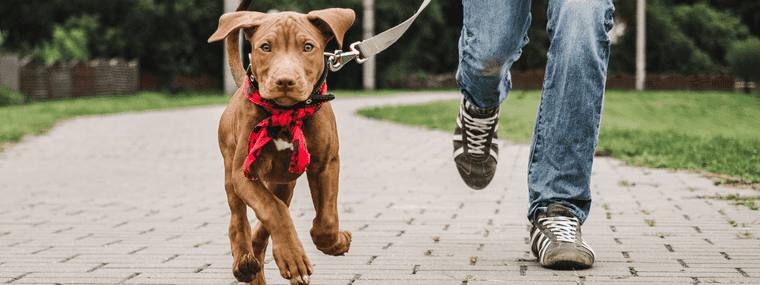
Setting up a safe and comfortable home environment
No single type of environment is perfect for the care and maintenance of a dog. It must be risk-free for your pet, regardless of the particular conditions that the dog may be experiencing.
Here are starter tips for first-time dog owners on how to make a puppy feel comfortable:
- Create a designated space. Designate a specific area in your home for your puppy to eat, sleep, and play. This could be a crate or a large pen for your puppy to move around.
- Puppy-proof your home. Secure hazardous items such as cleaning supplies, toxic plants, loose electrical cords, and toxic foods- grapes (or raisins), onions, chocolates, and macadamia nuts. Keep valuable or fragile items out of reach of your pup.
- Provide comfortable bedding. Ensure that your dog has a comfy bed or crate pad for sleeping. Also, the bedding should be the right size for your doggo and easy to clean.
- Provide a secure outdoor space. Double-check your yard is fully enclosed and secure so that your puppy won’t have a chance to escape. A shady area and plenty of water would also benefit your pet. Avoid using lawn pesticides and other household pesticides or herbicides as studies show a correlation with an increased risk of certain cancers.
- Consider installing puppy gates. Use puppy gates to block off any areas of your home you don’t want your puppy to have access to. Pro tip: for medium to large breeds you may need to stack two baby gates (i.e., place one on top of another) since larger puppies will jump or climb out of the typical gates.
- Calming environment. The modern dog's environment is frequently limited to urban settings, and urban life typically involves being subjected to numerous, repetitive, and often very intense visual and auditory stimuli. It’s of the utmost importance to ensure that your puppy doesn't connect the surroundings with feelings of anxiety or any other unpleasant experiences.
- Help your puppy to adjust to the environment. The hustle and bustle of city life can be fascinating for you, but it can be very stressful for a puppy. You should pay particular attention to gradually acclimating your pet to the conditions of the environment, as well as the numerous situations it will have to face later in life, such as cars, escalators, elevators, trains, trams, buses, and many more.
- Prepare your puppy to stay at home alone. In addition, the puppy needs to become accustomed to spending long periods alone at home. On the other hand, they shouldn't be afraid, make a mess, etc.
- Provide unlimited attention and love. Puppies thrive on attention and love. Spend plenty of time with your new friend, play with them, and give them lots of affection and mental stimulation.
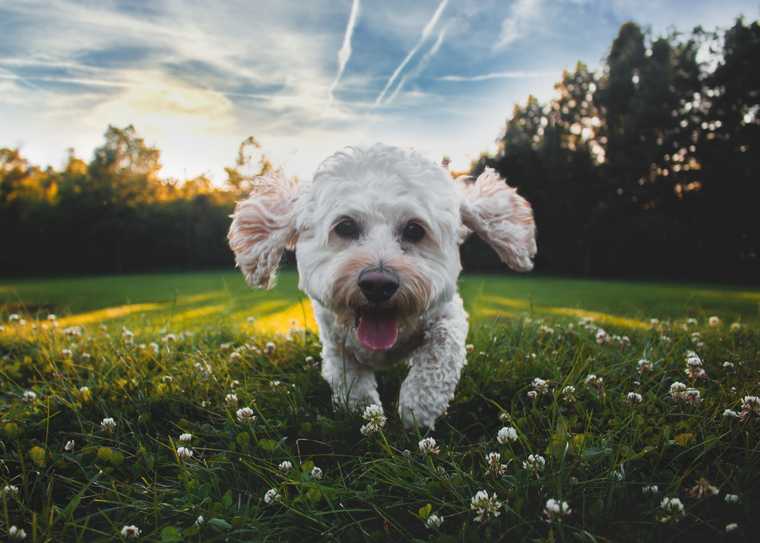
Purchasing essential supplies
Before picking up your future family member, prepare well and buy everything you need. You don't have to buy half the store as small dogs only need a little.
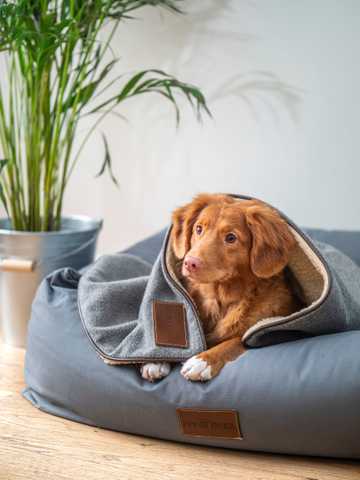
So what do you need for a new dog? This starter pack includes the following essentials:
-
A puppy collar, leash, and bags for walks.
-
Food and bowls. Consider this: instead of buying a food bowl, buy interactive toys, so that your dog eats slower and has a funny and stimulating time while eating.
-
Comfy bed and blanket.
-
Treats and toys.
-
Travel bag.
Preparing for the financial costs of owning a dog
Although the expenses of dog ownership can fluctuate depending on factors such as breed, age, health, and lifestyle, it’s essential to consider several factors to guarantee your dog's overall health and happiness in the long run.
-
The first expenses are connected with buying the puppy itself. The price can differ depending on the breed and where you take the dog from.
-
Then you will have mandatory pay for identification with a passport and a microchip. And, of course, don’t forget about vaccination. Typically, two rounds of vaccinations are administered within the first 12 weeks of a puppy's life.
-
Then there are the lifetime food costs, which also depend on the breed and age of your dog.
-
Grooming is also an indispensable part of pet care; depending on the coat type, you will most likely need to take your dog to a professional.
-
Regular check-ups at the veterinarian and treatment of the dog will also take up most of the finances.
-
Finally, regular antiparasitic treatments will help eliminate parasites if an infection has already occurred or reduce the risk of infection.
Establishing routines and training
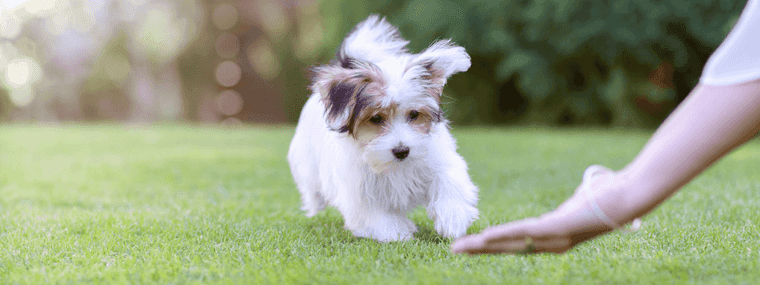
Establishing a feeding and exercise routine
When a young puppy moves into a new home for the first time, they try to understand and adjust to its new family and environment. Once you establish a daily routine for your pet, its life will have much more structure and purpose.
Your puppy will feel more at ease because they will understand what will happen next if you establish and stick to a daily routine for them. It will make their environment more predictable and, therefore, more comfortable.
Maintaining your dog's physical health is the most obvious reason it needs regular exercise. Your dog's physical and mental health will benefit significantly from engaging in new activities, such as learning new commands and behaviors. Working through a training routine gives your dog a chance to exercise their mental muscles, practice problem-solving skills, and even helps to strengthen the bond that you share with them.
House training and crate training
The key to successfully house-training your new puppy is to be consistent and patient and to use positive reinforcement. The intention is to instill positive behaviors and to develop a strong emotional bond with your pet.
If you don't plan on keeping your dog outside, it's necessary to train them to use the designated toilet area or teach the dog to pee outside. House training, also known as housebreaking or potty training is one of the first things you should work on with your dog because it teaches them where the bathroom is. Using a crate during the training process is a very beneficial tool.
Basic obedience training and socialization
It is essential to have a strategy before beginning to train your dog if you wish for the process to be successful. You will need to acquire some training-related knowledge, set a training schedule, and gather the necessary equipment. You must also be fully committed and ready for a daily commitment to succeed.
Socialization involves educating your pup, regardless of age, to interact positively with unfamiliar people, animals, and surroundings. Dogs that have been appropriately socialized have a lower risk of developing behavioral issues and are, on the whole, more accepted by people. Participating in social activities can also prevent the development of anxiety and unfounded fears.
You are not alone in having your dog trained. Woofz can help you create the appropriate training program and tips for new dog owners to make it effective and fun.
Health and wellness

Regular veterinary checkups and vaccinations
Even if your pet doesn’t appear to have any health problems, you still need to schedule a routine physical exam with your veterinarian at least once or twice a year. Your pet can achieve and keep its ideal state of health with the help of these wellness checkups.
By bringing your healthy animal for its recommended checkups at the veterinarian, you are allowing your veterinarian to evaluate your pet's overall health and well-being.
During the regular check-up, your veterinarian will assess two main areas:
- Identify early signs of diseases to help with timely treatment before they worsen into more severe conditions.
- Detects signs of existing health conditions that will prevent their occurrence or progression in the future.
Grooming and hygiene
You can eliminate shedding, fleas, ticks, and various health conditions. Having a well-groomed pet is about more than just having a cute animal. Grooming your puppy is an excellent way to prevent and treat potentially dangerous conditions. You will also be able to detect any diseases or conditions hiding in the background at an earlier stage.
Exercise and nutrition
Proper nutrition is essential for the optimal health and well-being of your pup. A healthy diet for your pet should consist of various foods that can supply them with all the essential nutrients they require depending on age, size, breed, health state, and activity level. Also note that some foods can be dangerous for your dog.
Exercising is vital for overall mental and physical health. Regular exercises will help your dog stay strong and healthy, improve mobility, and lower the risk of illnesses. Training your pet can help improve their overall mood, as well as lower their levels of stress and anxiety.
You can exercise your pet by engaging in several activities, such as walking, playing fetch, swimming, or running around.
Common challenges and solutions
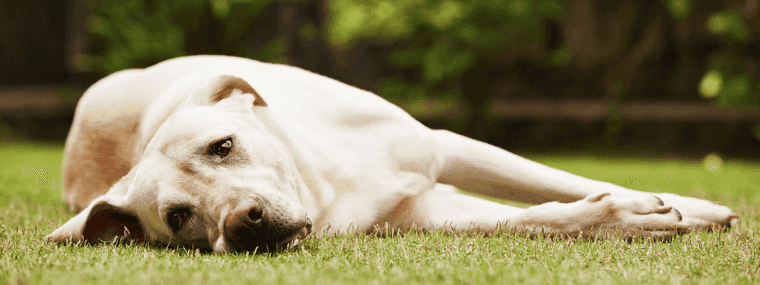
Separation anxiety and destructive behavior
When you decide to get a dog, you should be aware that, just like people, dogs can also experience anxiety. For instance, when left alone or separated from their caretakers, puppies who suffer from separation anxiety may chew on shoes, and furniture, dig holes, do their business inside even if they're fully housetrained, or destroy objects at home. These behaviors can lead to self-injury.
By downloading Woofz you will get a complete guide for first-time dog owners to help you understand how your pet feels at home alone and provide you with activities to keep your dog calm when you’re away.
Barking and other unwanted behaviors
Your dog's barking serves as an outlet for the dog's natural emotional state and a method of communication with other dogs, animals, and people.
Dogs may bark for various reasons, including expressing excitement or frustration, seeking attention, or inviting other dogs to play. Nonetheless, some dogs can bark without any apparent cause.
With Woofz, you will get tips for new dog owners on dealing with barking and other issues.
Dealing with emergencies
As a pet owner, your utmost priority is to ensure the safety and well-being of your furry companions. However, despite our best efforts, emergencies can still occur. Such emergencies can vary in severity, from minor scratches to life-threatening situations, and it's crucial to be equipped with the knowledge to handle them.
Wrap Up
Before becoming a new dog owner, it's essential to understand the responsibilities of dog ownership and the level of commitment it entails. The initial stages of dog ownership can be particularly challenging, especially if you're entirely new to this role. Yet, if you are ready to accept this challenge and know what to expect, it will definitely be a lovely journey for both of you!
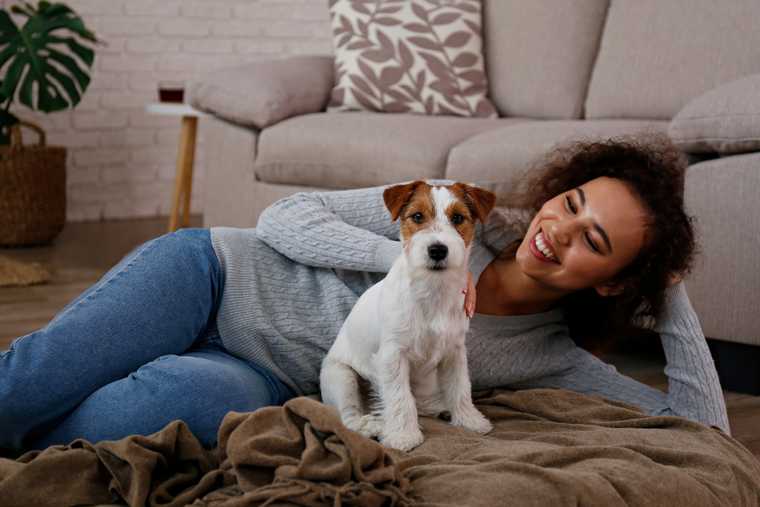
Despite growing up a puppy being hard work, you will get unconditional love, a devoted friend, and round-the-clock entertainment if everything is done correctly and responsibly.

Passionate team dedicated to help pet owners raise safe and obedient dogs, fostering meaningful connections with their furry companions.

Certified dog trainer, exclusive positive reinforcement methods & tackling aggression problems.